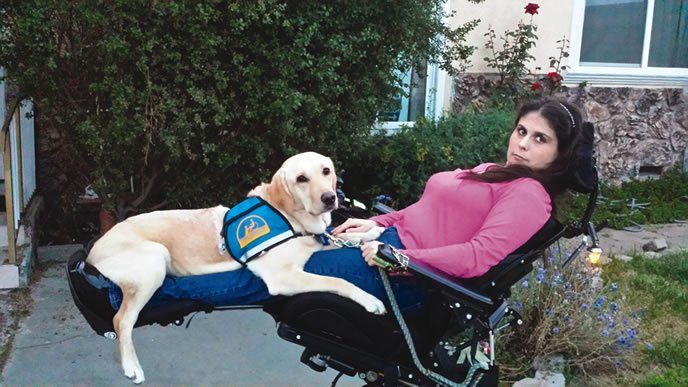Whether it’s the most common violation of these three Acts (ADA, Fair Housing, and Air Carrier Access) or the one that makes advocates for the disabled the angriest is a matter of debate, but the most talked-about abuse of legislation that protects the rights of disabled people has to do with “fake service dogs.”
In some cases, this is a matter of people who are not disabled trying to pass off their dogs as service dogs in order to bring their dogs with them into places dogs are not ordinarily allowed. In others, it’s people taking emotional-support dogs into places where only service dogs are allowed, such as restaurants, grocery stores, and public transportation.
The perpetrators of these violations may themselves be ignorant of the laws they are breaking, or knowingly taking advantage of the ignorance (or resignation) of the business owners or operators who could – theoretically – lawfully turn them away or even (in some states) summon law enforcement officials to enforce the health codes or other state laws that restrict non-service dogs.
Individual state laws vary. In the case of misrepresenting a pet dog as a service dog, the relevant laws often deal with the misrepresentation of the person, not the dog – meaning, it is a crime to falsely present oneself as being disabled and therefore in need of a service dog.
There is no federal law against representing a pet dog as a service dog. The Americans with Disabilities Act is a civil rights act designed to protect the rights of people with disabilities, including those who use service dogs. The ADA does not address individuals without disabilities, such as anyone who might falsely claim that a pet is a service animal.
“Because this issue does not address the civil rights of people with disabilities, it is not in our regulating authority under the ADA to issue regulations to penalize false claims that a pet is a service animal. However, we note that state civil or criminal law may already penalize such claims in some circumstances,” a Department of Justice spokesperson told us.
That’s the law, but what’s morally and ethically right? We think it’s important to keep the people that the laws are in place to protect – the disabled – foremost in consideration. When in “mixed” company, dogs who are less than perfectly behaved make it more difficult for actual service dogs to perform their own important work. Also, poorly behaved dogs may increase the slow-burning resentment of business operators toward all dogs, leading to an atmosphere of suspicion and a distinct lack of welcome.

How to catch a fake service dog
This is a trick; the fact is, you can’t always identify a fake service dog, just like you often can’t always visually detect a person’s disability. As dog lovers, we can’t help but notice other dogs, especially in places that don’t welcome all dogs. And when we see dogs with people who appear perfectly abled, it can be easy to wonder why the person has a service dog and if it’s legitimate.
“Society has a lot of issues with invisible disabilities – the whole ‘you don’t look disabled’ thing,” says Matthew Karpinski, chief legal officer for The ProBoneO Program. “Just because a person doesn’t look disabled doesn’t mean he’s not. I don’t know anybody with a disabled parking placard who isn’t in a wheelchair who hasn’t been confronted by some self-efficacious person challenging them. What somebody looks like gives you no information about their disability status.”
Even assessing the dog’s behavior isn’t 100 percent accurate when it comes to spotting what you might think is a “fake” service dog. Often, the dog suspected to be a “fake” is owned by a disabled person who is doing the best she can to train her dog for public access, but whose dog might be struggling with that facet of the job.
“There are people who take a pet dog they already have and try to turn it into a service dog because they can’t afford to get or keep two dogs,” says ProBoneO’s executive director, Dailyah Rudek. “Some people will wash out a dog with problems, but many won’t; they’ll try and work through the issue because they don’t feel like they have any other options.”
“I have met several task-trained service dogs who aren’t dogs you’d want to take with you for public access because they aren’t comfortable in public,” Karpinski says. “That doesn’t mean they aren’t true service dogs, but it might mean that they are useful to their partners only at home.”
Bottom line: Whether the dog is a legitimate task-trained service dog or dog-in-training, or belongs to a pet owner trying to get away with cruising the coffee shop with his Cockapoo, if the dog is ill behaved, the problem should be immediately addressed by the business establishment.






